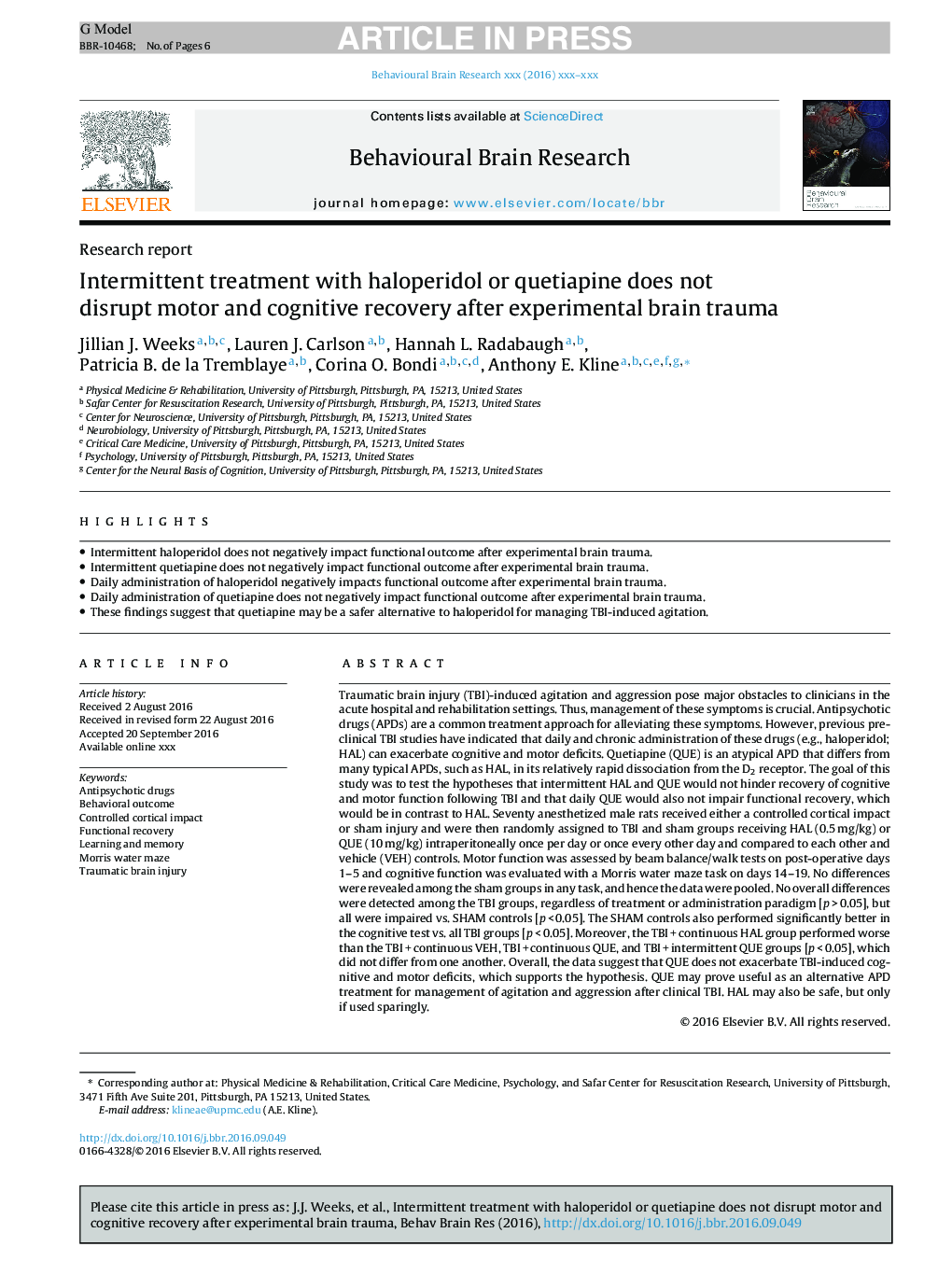| کد مقاله | کد نشریه | سال انتشار | مقاله انگلیسی | نسخه تمام متن |
|---|---|---|---|---|
| 8837946 | 1612895 | 2018 | 6 صفحه PDF | دانلود رایگان |
عنوان انگلیسی مقاله ISI
Intermittent treatment with haloperidol or quetiapine does not disrupt motor and cognitive recovery after experimental brain trauma
ترجمه فارسی عنوان
درمان متناوب با هالوپریدول یا کورتیاپین، پس از آسیب مغزی تجربی مغزی، بهبودی حرکتی و شناختی را مختل نمی کند
دانلود مقاله + سفارش ترجمه
دانلود مقاله ISI انگلیسی
رایگان برای ایرانیان
کلمات کلیدی
موضوعات مرتبط
علوم زیستی و بیوفناوری
علم عصب شناسی
علوم اعصاب رفتاری
چکیده انگلیسی
Traumatic brain injury (TBI)-induced agitation and aggression pose major obstacles to clinicians in the acute hospital and rehabilitation settings. Thus, management of these symptoms is crucial. Antipsychotic drugs (APDs) are a common treatment approach for alleviating these symptoms. However, previous preclinical TBI studies have indicated that daily and chronic administration of these drugs (e.g., haloperidol; HAL) can exacerbate cognitive and motor deficits. Quetiapine (QUE) is an atypical APD that differs from many typical APDs, such as HAL, in its relatively rapid dissociation from the D2 receptor. The goal of this study was to test the hypotheses that intermittent HAL and QUE would not hinder recovery of cognitive and motor function following TBI and that daily QUE would also not impair functional recovery, which would be in contrast to HAL. Seventy anesthetized male rats received either a controlled cortical impact or sham injury and were then randomly assigned to TBI and sham groups receiving HAL (0.5 mg/kg) or QUE (10 mg/kg) intraperitoneally once per day or once every other day and compared to each other and vehicle (VEH) controls. Motor function was assessed by beam balance/walk tests on post-operative days 1-5 and cognitive function was evaluated with a Morris water maze task on days 14-19. No differences were revealed among the sham groups in any task, and hence the data were pooled. No overall differences were detected among the TBI groups, regardless of treatment or administration paradigm [p > 0.05], but all were impaired vs. SHAM controls [p < 0.05]. The SHAM controls also performed significantly better in the cognitive test vs. all TBI groups [p < 0.05]. Moreover, the TBI + continuous HAL group performed worse than the TBI + continuous VEH, TBI + continuous QUE, and TBI + intermittent QUE groups [p < 0.05], which did not differ from one another. Overall, the data suggest that QUE does not exacerbate TBI-induced cognitive and motor deficits, which supports the hypothesis. QUE may prove useful as an alternative APD treatment for management of agitation and aggression after clinical TBI. HAL may also be safe, but only if used sparingly.
ناشر
Database: Elsevier - ScienceDirect (ساینس دایرکت)
Journal: Behavioural Brain Research - Volume 340, 15 March 2018, Pages 159-164
Journal: Behavioural Brain Research - Volume 340, 15 March 2018, Pages 159-164
نویسندگان
Jillian J. Weeks, Lauren J. Carlson, Hannah L. Radabaugh, Patricia B. de la Tremblaye, Corina O. Bondi, Anthony E. Kline,
